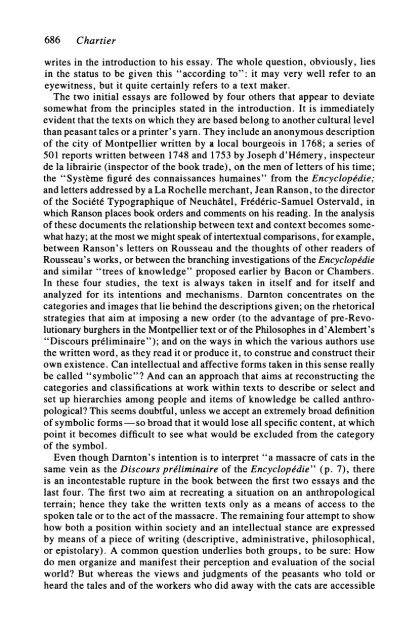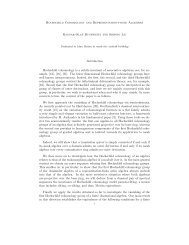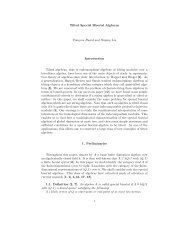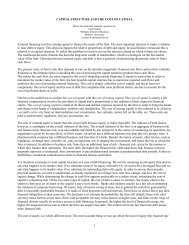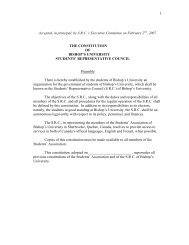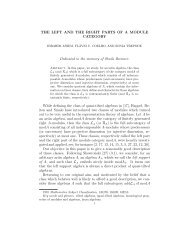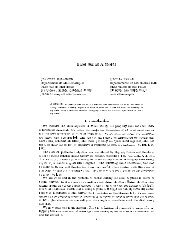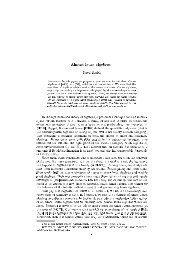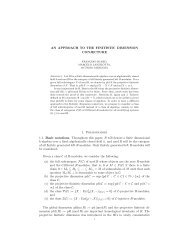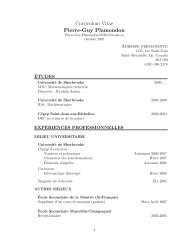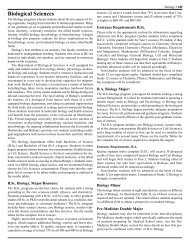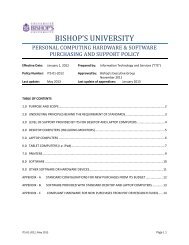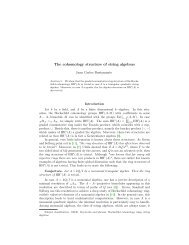Review: Text, Symbols, and Frenchness Roger Chartier The Journal ...
Review: Text, Symbols, and Frenchness Roger Chartier The Journal ...
Review: Text, Symbols, and Frenchness Roger Chartier The Journal ...
Create successful ePaper yourself
Turn your PDF publications into a flip-book with our unique Google optimized e-Paper software.
686 <strong>Chartier</strong><br />
writes in the introduction to his essay. <strong>The</strong> whole question, obviously, lies<br />
in the status to be given this "according to": it may very well refer to an<br />
eyewitness, but it quite certainly refers to a text maker.<br />
<strong>The</strong> two initial essays are followed by four others that appear to deviate<br />
somewhat from the principles stated in the introduction. It is immediately<br />
evident that the texts on which they are based belong to another cultural level<br />
than peasant tales or a printer's yarn. <strong>The</strong>y include an anonymous description<br />
of the city of Montpellier written by a local bourgeois in 1768; a series of<br />
501 reports written between 1748 <strong>and</strong> 1753 by Joseph d'HCmery, inspecteur<br />
de la librairie (inspector of the book trade), on the men of letters of his time;<br />
the "Systkme figurC des connaissances humaines" from the Encycloptdie;<br />
<strong>and</strong> letters addressed by a La Rochelle merchant, Jean Ranson, to the director<br />
of the SociCtC Typographique of Neuchltel, FrCdCric-Samuel Ostervald, in<br />
which Ranson places book orders <strong>and</strong> comments on his reading. In the analysis<br />
of these documents the relationship between text <strong>and</strong> context becomes somewhat<br />
hazy; at the most we might speak of intertextual comparisons, for example,<br />
between Ranson's letters on Rousseau <strong>and</strong> the thoughts of other readers of<br />
Rousseau's works, or between the branching investigations of the Encycloptdie<br />
<strong>and</strong> similar "trees of knowledge" proposed earlier by Bacon or Chambers.<br />
In these four studies, the text is always taken in itself <strong>and</strong> for itself <strong>and</strong><br />
analyzed for its intentions <strong>and</strong> mechanisms. Darnton concentrates on the<br />
categories <strong>and</strong> images that lie behind the descriptions given; on the rhetorical<br />
strategies that aim at imposing a new order (to the advantage of pre-Revolutionary<br />
burghers in the Montpellier text or of the Philosophes in d'Alembert's<br />
"Discours prkliminaire"); <strong>and</strong> on the ways in which the various authors use<br />
the written word, as they read it or produce it, to construe <strong>and</strong> construct their<br />
own existence. Can intellectual <strong>and</strong> affective forms taken in this sense really<br />
be called "symbolic"? And can an approach that aims at reconstructing the<br />
categories <strong>and</strong> classifications at work within texts to describe or select <strong>and</strong><br />
set up hierarchies among people <strong>and</strong> items of knowledge be called anthropological?<br />
This seems doubtful, unless we accept an extremely broad definition<br />
of symbolic forms-so broad that it would lose all specific content, at which<br />
point it becomes difficult to see what would be excluded from the category<br />
of the symbol.<br />
Even though Darnton's intention is to interpret "a massacre of cats in the<br />
same vein as the Discours prtliminaire of the Encycloptdie" (p. 7), there<br />
is an incontestable rupture in the book between the first two essays <strong>and</strong> the<br />
last four. <strong>The</strong> first two aim at recreating a situation on an anthropological<br />
terrain; hence they take the written texts only as a means of access to the<br />
spoken tale or to the act of the massacre. <strong>The</strong> remaining four attempt to show<br />
how both a position within society <strong>and</strong> an intellectual stance are expressed<br />
by means of a piece of writing (descriptive, administrative, philosophical,<br />
or epistolary). A common question underlies both groups, to be sure: How<br />
do men organize <strong>and</strong> manifest their perception <strong>and</strong> evaluation of the social<br />
world? But whereas the views <strong>and</strong> judgments of the peasants who told or<br />
heard the tales <strong>and</strong> of the workers who did away with the cats are accessible


